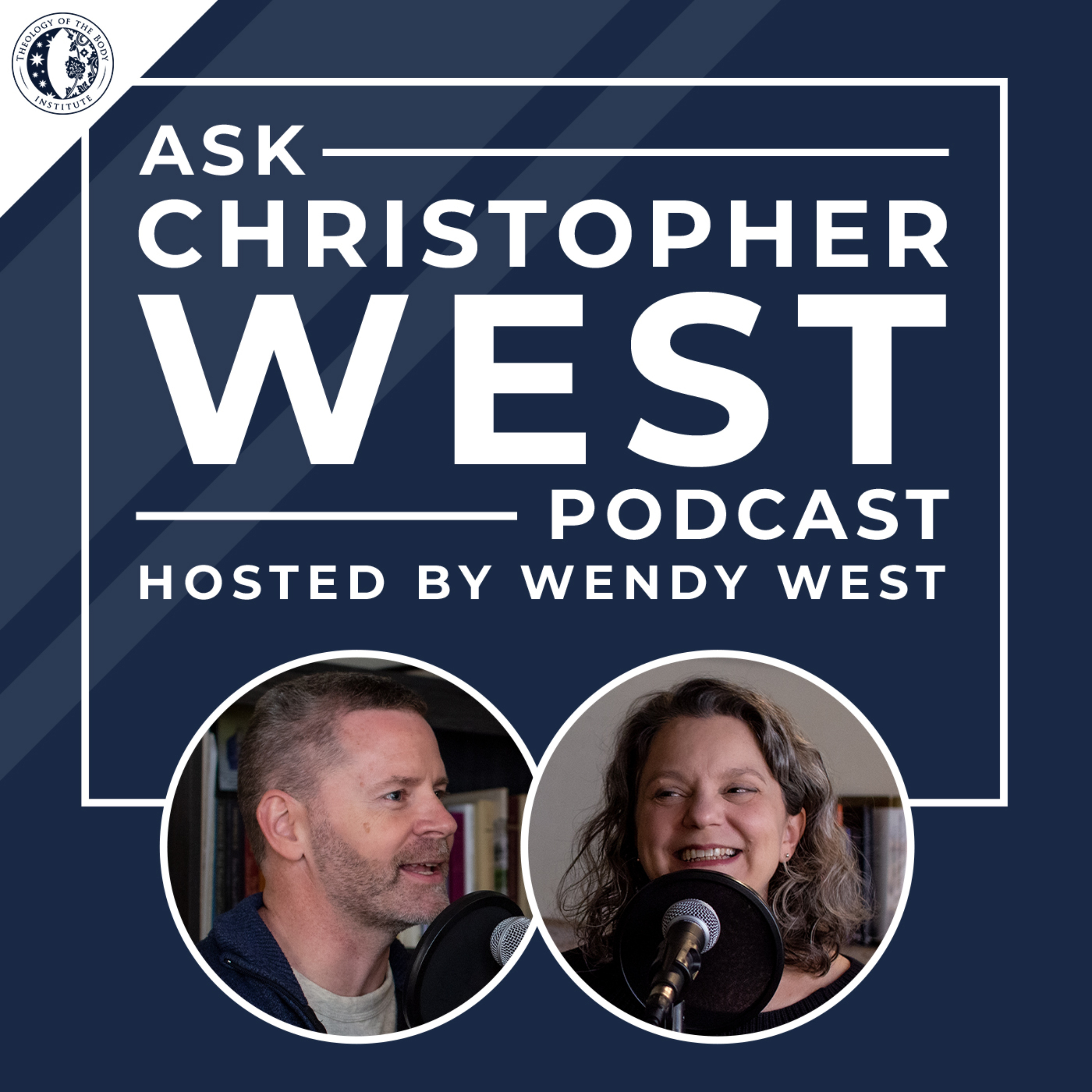
Catholicism 101: Forever Learning and Living the Faith
Learning the Catholic Faith is a lifelong process. For many of us, it may have had a rocky start from a lack-luster classroom experience, being a disinterested student, or a lack of exposure to the teachings of the Faith. Catholicism 101 is here to fill in the gaps from your Religious Education experience as well as serve as an aid in your lifelong learning of the Faith. Not only will we talk about WHAT the Church teaches, but WHY she teaches it. Hopefully along the way we will find ourselves falling deeper into the heart of Christ as we learn more about His heart for us.
"Always be ready to give an explanation to anyone who asks you for a reason for your hope." 1 Peter 3:15
Have a question about the Faith you’d like to have answered on the Podcast? Submit it here: https://forms.gle/zorQwuUGtSdukzjc6
Emily Gipson | Director of Catechetical Formation - St. Mary of the Woods Catholic Church | Whitesville, KY
Catholicism 101: Forever Learning and Living the Faith
E22: The Art of Evangelization in the Modern World
What do we mean by the phrase “Christians must live in the world without being of the world?”
How can we lead people to an encounter with the Heart of Christ in an age of impersonal social media and screens?
Join us for this month’s episode of Catholicism 101 as we reflect on a lesser-known letter from Pope Francis on the importance of literature in encountering the human heart, as “nothing that is human is indifferent to us.” (Letter of the Holy Father on the Role of Literature in Formation, 17 July 2024, para 37.)
Resources:
Letter of His Holiness Pope Francis on the Role of Literature in Formation
Evangelii Gaudium | Pope Francis (2013)
Beauty in the Catholic Tradition | Bishop Robert Barron
The Human Heart and The Power of Beauty | Theology of the Body Institute
Teaching Our Sons How To Look At Scantily-Clad Women | Catholic Mom
Have a question about the Faith you’d like to have answered on the Podcast? Submit it here: https://forms.gle/zorQwuUGtSdukzjc6
· “The world writes the agenda for the Church. That doesn’t mean that the Church is to conform to the ways of the world. Quite the contrary. What it does mean is that the Church’s evangelizing work has to be in response to where people actually are. It’s no good just handing out the same old things in the same old way. If the Church is to remain relevant, if it’s to continue speaking in a meaningful way to a rapidly changing world, if it’s to keep up with new knowledge and ideas which change our ways of understanding the world in which we live, it has to renew itself constantly in the way it expresses its message and dialogues with the world… A changing world involves new challenges of what is right and wrong, a changing world brings about new social problems, new forms of poverty, injustice, exploitation and discrimination, lack of freedom, and the absence of peace. There have to be new ways of preaching and witnessing to the Gospel Truth. For this we need the prophetic role of the Church, built on the foundations of tradition and continuity.” (Fr. Brian’s homily, Sts. Peter & Paul, 2025)
o Truth is objective and never changes. When we say that the Church must keep up with the times as they are changing, we in no sense mean that the doctrine and dogmas of the Church must change to suit the modern day. What we mean by “meeting people where they’re at” is that we are called to communicate objective, unchanging truth in a manner that resonates with the heart of that person at the present moment.
§ This can be done without compromising truth! We must preach the Gospel and the difficulties of living a life of faith with joy—it is truly good news! Tough love can be done with joy and hope.
· “Today, our challenge is not so much atheism as the need to respond adequately to many people’s thirst for God, lest they try to satisfy it with alienating solutions or with a disembodied Jesus” (Francis, Evangelii Gaudium, 89).
o We all have hearts that have been wounded in many very different ways, but also in many similar ways. When we try to respond to these wounds first and foremost with philosophies, principles, theories, etc—this is the very “disembodied Jesus” Pope Francis urges us to refrain from evangelizing with, truth without love.
§ Yes—logic, philosophies, principles, and theology are all vastly important and have their rightful duty and place. Many people actually are evangelized by their brain being ‘tickled’—but not every human heart is sensitive and drawn to academia. These things are very good and very necessary, but in approaching a heart in search for the Truth, we must first remember that Truth is a body-soul person!
· “We must always take care never to lose sight of the ‘flesh’ of Jesus Christ: that flesh made of passions, emotions and feelings, words that challenge and console, hands that touch and heal, looks that liberate and encourage, flesh made of hospitality, forgiveness, indignation, courage, fearlessness; in a word, love” (Francis, Role of Literature in Formation, 14).
o Alienating solutions—really involves the compromising of truth in the name of “love;” allowing the wound to be further compromised by infection—“you do what makes you happy/feel good”
§ There is a good desire in this approach to care for the heart of the person that has clearly been wounded, but truly loving someone means doing what is best for them, especially when it requires some sort of sacrifice or makes you uncomfortable.
· Just because you’re uncomfortable speaking the truth or afraid of critique, condemnation, or people having a ‘less than’ opinion of you does not justify saying things such as “well I personally wouldn’t do that, but you do whatever makes you happy.” (again—we’re speaking of things where objective truth is at stake)
· Avoiding these two extremes—a disembodied Jesus and alienating solutions—requires much prayer, discernment, and great virtue.
o Virtue is a balance between two extremes. For example—humility is the beautiful, happy medium between self-reliance and self-condemnation. (This is why you often hear of ‘false humility’ especially in instances where someone can’t seem to take a compliment.)
o Growing in virtue is necessary for evangelization and cannot be found simply by reading textbooks on logic, philosophy, and apologetics—aka reasons to believe (emphasis on reason, as in reason & will). Again, these things are good and necessary and have their place! But, as Pope Francis has observed rightly about the Western World, we tend to lack a bit of poetry.
§ So, how do we bring balance back into our techniques of evangelization? We dive into the depths of the human experience and the human heart. The contents of the heart are made visible by art.
· The human person is often referred to as the masterpiece of God—his greatest work of art; the visible manifestation of his heart. “The body, in fact, and only the body, is capable of making visible what is invisible: the spiritual and the divine. It has been created to transfer into the visible reality of the world, the mystery hidden from eternity in God, and thus to be a sign of it” (TOB 19:4).
o When you encounter the inner workings, wounds, joys, and sorrows of another person—you encounter God Himself! “As Christians, nothing that is human is indifferent to us” (Francis, Role of Literature in Formation, 37).
· Good art and having ‘evangelical discernment of culture’
o You can be in this world without being of it, but what you feed yourself matters.
o It is 100% possible to consume secular content without it consuming you, but it is something that takes a lot of discernment and self-mastery.
§ Story of the Bishops in Antioch encountering a prostitute:
· In the early Christian Church, several bishops were gathered outside a Cathedral in Antioch, when a beautiful prostitute passed by on the street. Upon noticing her, the crowd of bishops looked away to avoid being seduced. Bishop Nonnus, however, stared intently at her, and then said to his fellow bishops, "Did not the wonderful beauty of that woman delight you?" The bishops remained silent. Nonnus insisted, "Indeed it delighted me," but he wept for her. When the prostitute saw how the bishop looked at her with such purity, she was caught off guard. No man had ever looked at her with such purity. He was not lusting after her, but rather saw something in her that she did not even see in herself. The simple purity of that one bishop's glance marked the beginning of her conversion to Christ. She soon returned to find him, and today, we know this former prostitute as St. Pelagia.
o Do you want to be looked at or do you want to be seen?
o “It is the heart that determines what the eyes really see [and what the ears really hear]” & “Christian, know thyself!”
o One of the greatest arts that convey the human heart is literature!!
§ Francis quotes French author Marcel Proust’s work, In Search of Lost Time, “[novels unleash] in us, in the space of an hour, all the possible joys and misfortunes that, in life, it would take us entire years to know even slightly, and of which the most intense would never be revealed to us because the slowness with which they occur prevents us from perceiving them.”
· Also quoting C.S. Lewis’ An Experiment in Criticism, “In reading great literature I become a thousand men and yet remain myself. Like the night sky in the Greek poem, I see with myriad eyes, but it is still I who see. Here, as in worship, in love, in moral action, and in knowing, I transcend myself; and am never more myself than when I do.”
§ Every human person is a work of art—a visible manifestation of the heart of God. When we transcend ourselves and encounter the hearts of others, we are truly more ourselves, encountering another part of our shared heart—the heart of God!!!!
· What is the greatest way to evangelize in our modern world? Slow down and get in touch with your own heart by consuming art, particularly literature. Give the Lord the mustard seed of reading a novel and allow him to transform your methods of evangelization as flowing from the heart as the lived experience of Truth.
o Final quote from Pope Francis’ Letter on the Role of Literature in Formation:
§ “Literature helps readers to topple the idols of a self-referential, falsely self-sufficient and statically conventional language that at times also risks polluting our ecclesial discourse, imprisoning the freedom of the Word. The literary word is a word that sets language in motion, liberates, and purifies it. Ultimately, it opens that word to even greater expressive and expansive vistas. It opens our human words to welcome the Word that is already present in human speech, not when it sees itself as knowledge that is already full, definitive, and complete, but when it becomes a listening and expectation of the one who comes to make all things new” (42).
Where to start & what to read? Discern in prayer what calls to you! Also—the classics are classics for a reason. Peruse your local library and ask for the guidance of the Holy Spirit in choosing a book, “Lord, what do you want to teach me about my heart?” He’ll take it from there. :)
Podcasts we love
Check out these other fine podcasts recommended by us, not an algorithm.

Ask Christopher West
Theology of the Body Institute
Chris Stefanick Catholic Show
Chris Stefanick | Real Life Catholic

